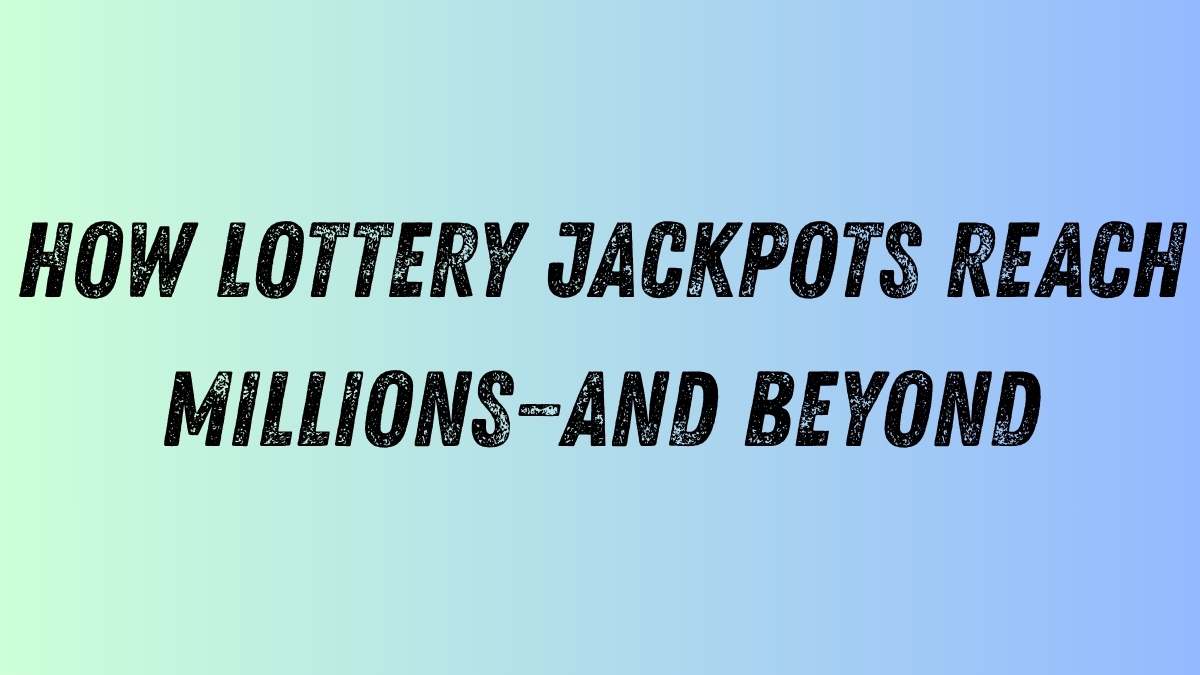Lotteries have become a huge part of modern life. People all over the world buy tickets hoping to win a life-changing prize. But have you ever wondered how lottery jackpots grow so big—sometimes reaching hundreds of millions of dollars? This article explains how lottery jackpots work, why they grow so large, and what makes them keep going up.
Let’s unlock the mystery behind those massive jackpot numbers!
What Is a Lottery Jackpot?
A lottery jackpot is the grand prize a player wins by matching all the required numbers in a lottery draw. It’s the biggest reward offered in the game. If no one wins the jackpot, the money rolls over to the next draw—this is where the fun begins.
How Does the Jackpot Start?
Each lottery has a starting jackpot amount. For example:
- Powerball usually starts at $20 million
- Mega Millions also starts at $20 million
These base amounts are set by the lottery organization and funded by ticket sales.
Ticket Sales: The Real Fuel
The real growth of jackpots comes from ticket sales. Every time someone buys a lottery ticket, a portion of that money goes into the prize pool. If millions of people buy tickets, the jackpot grows fast.
Here’s a simple breakdown of where the ticket money goes:
- A portion funds the jackpot prize
- Some funds go to smaller prizes
- Some go to retailers who sell the tickets
A part goes to state programs, like education or public services
What Happens When No One Wins?
When no player matches all the winning numbers, the jackpot rolls over to the next draw. This process keeps happening until someone wins. That’s how jackpots grow from millions to hundreds of millions—or even over a billion dollars!
Example:
If no one wins the $20 million jackpot, the next draw might be $30 million, then $50 million, and so on.
Why Do Jackpots Grow So Quickly?
Here are the main reasons:
- Rollovers
Every time there’s no winner, the jackpot amount increases. More rollovers = bigger jackpots.
- Increased Ticket Sales
As the jackpot grows, more people buy tickets. This brings in even more money to fuel the prize pool.
- Hype and Media Attention
Huge jackpots attract news coverage. That leads to more players joining in, creating a cycle that grows the jackpot even faster.
Multi-State Lotteries Boost Jackpot Growth
Some lotteries like Powerball and Mega Millions are multi-state games. That means players from many different states (sometimes all 45+ states) can participate. This brings in millions of ticket sales, which helps grow jackpots even faster than state-only lotteries.
Interest on Jackpot Money (Annuity Option)
If a player chooses the annuity option instead of the lump sum, the total prize shown is calculated with interest over 30 years. This means the lottery organizers don’t have to give that full amount right away—they invest the prize money and pay it over time.
That’s another reason why the advertised jackpot can look even bigger than the amount actually sitting in the prize fund.
How Big Can Jackpots Get?
There’s no real limit. As long as nobody wins and people keep buying tickets, the jackpot keeps rising.
Record-Breaking Examples:
- $2.04 billion Powerball jackpot – Nov 2022 (largest ever)
- $1.602 billion Mega Millions jackpot – Aug 2023
- $1.586 billion Powerball jackpot – Jan 2016
These jackpots made headlines around the world.
What Happens After a Jackpot Is Won?
Once a player wins the jackpot:
- The jackpot resets to the base amount (like $20 million)
- The winner chooses between lump sum or annuity
- Taxes are taken out before they receive the prize
Even after someone wins, the cycle starts again with fresh ticket sales and a new jackpot countdown.
Why Are Jackpots So Popular?
- Life-Changing Prize
People dream of what they could do with that money—buy homes, travel the world, help others, and live freely.
- Low Entry Cost
Most tickets cost just $2. That small price gives people a chance to win millions.
- Hope and Excitement
Even if the odds are small, people enjoy the excitement of “what if.”
The Role of Lottery Odds
The reason jackpots can roll over so many times is because the odds of winning are very low.
For example:
- Powerball odds: 1 in 292 million
- Mega Millions odds: 1 in 302 million
This means fewer people win the big prize, causing rollovers and helping jackpots grow even more.
Do Big Jackpots Help Lotteries?
Yes! Huge jackpots lead to:
- More ticket sales
- More money for state programs
- Greater public interest and attention
Lotteries use big jackpots to attract players and boost their funds.
Jackpots don’t just grow by magic. They grow through smart systems—starting from a base amount, fueled by millions of ticket sales, and driven by excitement, rollovers, and media buzz.
When no one wins, the jackpot rolls over. That creates more hype, which brings in more players, and the cycle keeps going until one lucky person takes it all.
So next time you hear about a $500 million jackpot, you’ll know exactly how it got there!
